Arctic simulation proves a success

Students from across Scotland got to play the role of delegates charged with deciding the fate of the Arctic nations.
The University’s Mary Robinson Centre for Climate Justice hosted the diplomatic simulation, known as the Scotland Model Arctic Council (SCOTMAC).
SCOTMAC, which was designed by Polar Aspect for undergraduate students, invites participants to play the role of representatives from one of the eight Arctic States or Arctic Indigenous peoples' organisations.
The event, in collaboration with Trent University and Polar Aspect, featured expert teaching and guidance from Arctic specialists, three days of diplomacy to hone speaking and consensus-building skills, and social events to build lasting friendships with fellow delegates from universities in Scotland, the rest of the UK, and beyond.
Dr Sennan Matter, from Glasgow Caledonian's Mary Robinson Centre for Climate Justice, said: “The Arctic is rapidly changing because of climate change, and the communities which live there are facing a daunting physical and social upheaval as a result. The principles of cooperation and consensus to tackle shared challenges, that the real-life Arctic Council aims to achieve, could not be more relevant today in the Arctic, and the world, and SCOTMAC provided a valuable opportunity for students in Scotland to foster these principles by embedding themselves in the most pressing Arctic issues and learning about their place as global citizens.”
Three Glasgow Caledonian students were selected for the role of 'Arctic Council Secretariat' and were responsible for chairing and encouraging consensus among the country delegates as they discuss the themes of this year's SCOTMAC − the future of Arctic cooperation and climate engineering in the Arctic.
Timm Goenner, fourth-year Environmental Management undergraduate, said: “It was great being able to come together with students from all across Scotland. The model negotiations proved a very educational experience in the sense I learned a lot about the Arctic and the challenges it’s facing – not just from climate change, but also in the wake of the changing diplomatic landscape of the world at the moment.
“Our roles required us to perform note-taking, the facilitating of meetings and communication – all valuable skills to learn.”
Max Gill, third-year Environmental Management undergraduate, said: “The interdisciplinary nature of this event cannot be underestimated. We are obviously coming at it from an environmental management background, but there were students studying ornithology or journalism, for example, also participating. It was great to see how they approached and contributed to the simulated issues presented to us.
“The way of life of those in the Arctic nations is rapidly changing and they are disproportionately being affected by climate change. It really is vital that people around the world wake up to this.”
